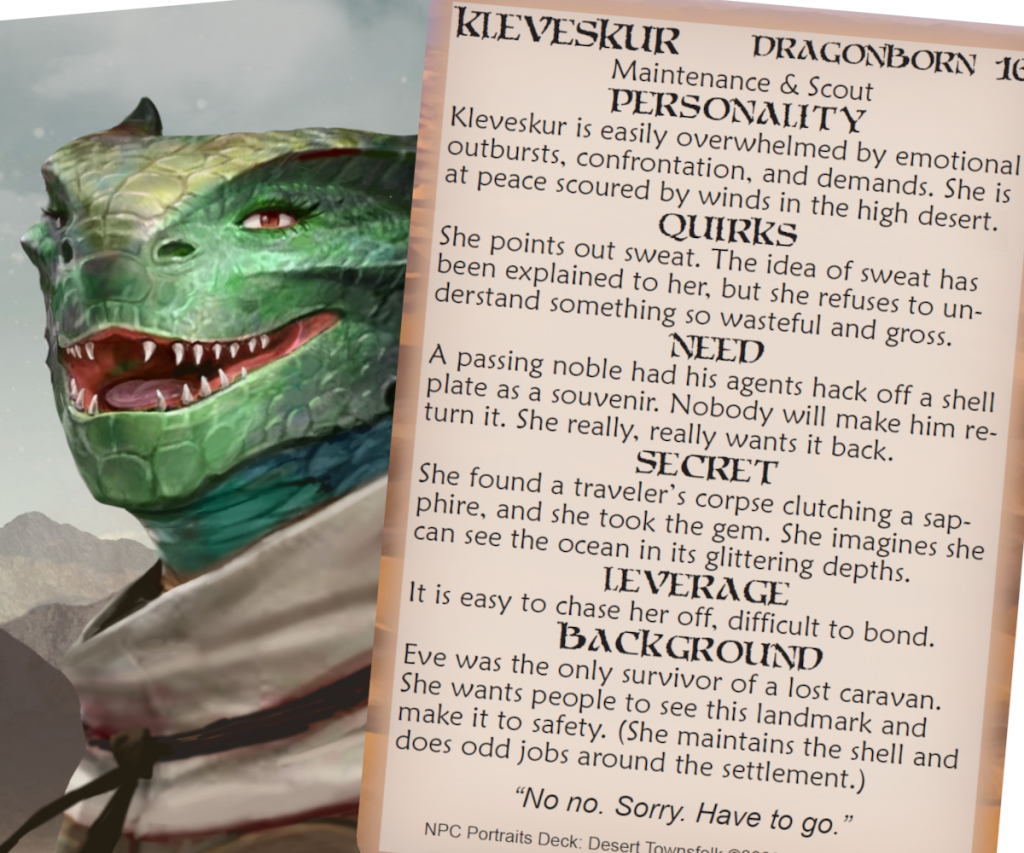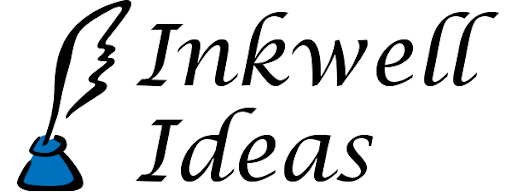What Makes an Effective NPC?

[Editor’s note: This post comes from Andrew Shields, the writer of most of our NPC Portraits Deck cards for our current Fantasy Sidequest & NPC Decks Kickstarter. Thanks Andrew!]
Useful NPCs are a collaboration between the GM and the players. The GM puts in a bunch of quick sketches, plot silhouettes with a striking feature or some role in the world, and the players decide which ones they care about. As the characters focus on NPCs, the GM adds depth and color.
Maybe the players are looking for a blacksmith. The GM may start with nothing more than this; he is a muscular dragonborn who uses his fire to enhance the forge. The players may do some trading and go on their way—or they might take an interest in the blacksmith and follow up with conversation or repeat visits, wanting to keep that NPC in the game.
The NPC cards can support game sessions in three main ways. First, the GM can look them over and see which ones might be interesting for bringing in a plot hook or because portraying that character would be entertaining. Second, the GM can have an assortment of ready-to-go NPCs to drop in for a change of pace or some people of interest in a social situation. Third, the characters may go looking for someone with a specific role (like a job or expertise), and the NPC cards provide a selection that the characters can find.
Plot hooks.
Many of the NPC decks include something that the character needs: something must be done, and the characters may be able to do it. Therefore, every NPC card can add action to the game.
GMs can look at these needs ahead of time and combine a couple cards to anchor a session’s activity, or pull an NPC in fast and have a motivation for them that presses them to deal with the PCs. For the location-based NPCs, the cards also have a secret that could motivate the NPC to take action to protect against its discovery.
These motivations can provide errands or local events that can fill out a session that would otherwise end early, or give a game group something to do for a session where some players couldn’t make it so the main plot is on hold.
The NPC cards also have a “leverage” section for most of the decks, giving some ideas for how they can be persuaded or intimidated, and how easy they are to deceive. These leverage points can give a GM tips for how to portray the character and react as PCs manipulate an NPC.
Ready-to-go NPCs.
Most of the cards include “quirks” for the NPCs. These quirks are quick reference points for the GM who describes or portrays the NPC, a way to help players visualize the character. The quirks don’t require the GM to use an accent or some special skill. The GM gets an idea of how to make this NPC feel a little different than the others, in a way that can be repeated every time the characters meet the NPC. A halfling NPC may expect everyone to be at eye level before they converse, resenting anyone talking down to them. Another NPC may be fidgety and distracting any time he is not the center of attention.
Characters will also seek out people with particular talents or roles. Many NPC decks have a primary and secondary role for each character. In the Henchman deck, each NPC has an additional service they can offer. NPC decks based on settlements have NPCs that can offer the services you’d expect in that kind of settlement.
If PCs go looking for a scholar, you might already have one or two ready from the NPC cards you are using. If the players like (or dislike) the NPC and take an interest, the GM can check the card to see what the NPC needs, and also consider the NPC’s secret, so there’s room to expand the NPC’s place in the story. The NPC’s need can come up the first time the PCs meet them, or it can wait until a second or third contact, making it easier for the NPC to help the GM manage the game’s pacing.
Is there a rival adventuring party? Draw 4 cards from the NPC Adventurer deck! There is an entire deck of henchmen, including guards and porters as well as sages and guides. The upcoming Tavern deck can quickly fill out a random crowd with interesting staff or patrons.
Whether the characters are looking around to see who is in the theater of the mind with them, or the players are looking for experts, NPC cards can relieve the strain on the improvising GM who provides them with people to find.
